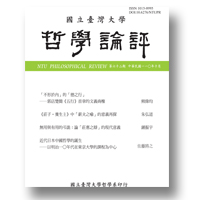|
1.
|
NTU Philosophical Review:
Year >
2017 >
Issue: 53
黃文宏
Wen-Hong Huang
論洪耀勳「真理論的絕對辯證法」的構想
On Hung Yao-Shun’s Conception of “Absolute Dialectics of Alethiology”
view |
rights & permissions
| cited by
Hung Yao-Shun (1903-1986), one of the major Taiwanese philosophers in the Japanese ruled period, whose research deserves more attention today. My intention in this paper is twofold: First, to clarify some basic concepts of his “absolute dialectics of alethiological dialectics”, and secondly to indicate some possible developments of his logic. The paper is divided into five sections. After a brief introduction to the leading question of my paper (section one), I focus on his main philosophical work “Being and Truth - A Study of Schalwa Nuzubidse’s Alethiology” published in April 1938 (totally 145 pages). Nuzubidse attempts to explicate the traditional metaphysics as an aletheological realism, aiming at the disclosure of the truth-in-itself. Some of the basic concepts of Nuzubidse’s alethiology and Hung’s interpretation are discussed here (sections two, three, four). Through these discussions, we can see that Hung goes deeply into the core of Nuzubidse’s alethiology and radicalizes his alethiological realism step by step to an “Absolute Dialectics of Alethiology”. Finally, Hung’s critique on Nuzubidse is discussed in the last section (section five). Hung’s project remains an unfinished ideal, which makes some of his creative thoughts still obscure. By explicating his concepts and reinforcing his arguments, some of the possible contributions and new perspectives that Hung provided to philosophy will be expounded in this section.
|
|
|
2.
|
NTU Philosophical Review:
Year >
2017 >
Issue: 53
Hsiu-Lin Ku
古秀鈴
On the Very Idea of a Minimal Proposition
論極小命題
abstract |
view |
rights & permissions
| cited by
Can the idea of a minimal proposition be successfully held? I will first formulate what the minimal proposition is in the minimalist’s mind, taking Emma Borg as the representative. What a minimalist seeks for a minimal proposition is the abstract and skeletal core meaning of a sentence, and this faith is founded on the notion of minimal word meaning—an atomic, code-like, conceptual thing. I show that the problem of this notion of minimal proposition lies in the three features, intuitive read-off, invariantness, and truth-evaluability, that Borg ascribes to it. I shall argue, first, that positing a conceptual-like thing as the invariant minimal content of word cannot support the invariantness of the minimal proposition of a sentence, and second, that the skeletal content, as the minimal proposition of a sentence, is a grammatically analyzed product and thus is hardly truth evaluable. According to the analyses, the idea of a minimal proposition with these three features identified by minimalists cannot be maintained.
本文探討極小命題成立與否的基礎。首先,本文將以Emma Borg 為極小主義之代表,釐清極小主義者所謂的極小命題是種語句本身抽象而結構化的核心意義,並被賦予三種特色:直覺的、不變的、有真假可言的。本文論證具有此三種性質的極小命題是難以成立的。首先針對此主張的基礎─字詞本身的極小內容是一種不可再分、密碼般、概念化的對象─本文論證字詞展現在語句中的意義並非如此不變,因此難以支持極小命題的不變性。其次,本文論證,抽象而結構化的極小命題是邏輯分析後的產物,因此難以有真假值可言。
|
|
|
3.
|
NTU Philosophical Review:
Year >
2017 >
Issue: 53
Wim De Reu
魏家豪
On Goblet Words:
Coexistence and Writing in the Zhuangzi
論巵言─《莊子》之共存與寫作
abstract |
view |
rights & permissions
| cited by
This article attempts to reframe the state of research on the notion of goblet words (zhiyan) in the Zhuangzi. Recent studies predominantly view the notion of zhiyan as referring to peculiar stylistic forms exhibited in the Zhuangzi—forms such as dilemmatic questions and paradoxes. In this article, I question the quick identification of these forms as zhiyan. I argue that zhiyan are essentially definite yet provisional simple-form utterances located on the level of everyday interaction and coexistence. On this level, the peculiar stylistic forms do not play their part. However, such stylistic forms do become indispensable in discussing and recommending zhiyan. It is on this meta-level—for the Zhuangzi, the level of writing—that we find these forms employed. Based on structural similarities, we may stretch the label ‘zhiyan’ to include such forms but should keep in mind that any such extension is secondary to the use of language in coexisting with others.
本文嘗試重塑有關《莊子》巵言之研究。近年來,學界大多將巵言視為《莊子》中特殊文體形式,如兩難問題及悖論。本文對於是否能輕易地將這些形式視為巵言存疑,進而試圖論證巵言基本上是簡單形式的言辭,其特色為明確但暫時性的,作用於日常互動與共存上。於此層面,特殊文體形式可謂無用武之地;然而,於探討並進而提倡巵言之時,特殊文體形式便成為不可或缺的一環。正是於此後設之層次─就《莊子》而言,則是寫作之層次─我們發現特殊文體形式之運用。基於結構上之相似度,我們或能將此等文體稱為「巵言」,但同時不應忘記,其乃從屬於與他者共存時所運用之語言。
|
|
|
4.
|
NTU Philosophical Review:
Year >
2017 >
Issue: 53
廖育正
Yu-Zheng Liao
朱子心性論可以回應道德責任歸屬嗎?
Can Zhu Xi’s Theory of Mind Respond to Moral Responsibility?
abstract |
view |
rights & permissions
| cited by
在談論道德責任(moral responsibility)歸屬時,一種常被接受的看法是:某人對某事具有道德責任,若且唯若某人在自由意志下,促使了某事的發生。換句話說,若是人無從避免去做一件道德上應受譴責的事情,則不被歸屬道德責任。而朱熹(1130-1200)以心統性情的義理架構,作為其倫理思想的心性論基礎,這樣的系統究竟能否歸屬道德責任?當代學人對此有許多歧見。他們的意見為何產生衝突?朱子心性論可以回應道德責任歸屬嗎?這是本文意欲探究的重點。本文的結論是:當代學人各條研究進路之糾結,大致可以視為相容論與不相容論之爭的中國式展開;對此大哉問,形上學一日不得解,便一日沒有答案。然而在上述糾結之外,若還有回應問題的空間,或許在於以本體工夫論,兼及體驗論的視野,將心詮釋為性情的突現(emergence),去照應涵養省察、格物致知、克己主敬等思想─進而能將Peter van Inwagen 的話改寫為一種中國式的言說:心性情之間,別有一種神秘的工夫。
A commonly held view concerning moral responsibility is that someone has a moral responsibility for some action if and only if someone makes actions freely. In other words, if someone cannot avoid doing actions to be morally condemned, it is not attributable to moral responsibility. Can Zhu Xi’s theory of mind and ethical thoughts─xin-tong-xing-qing 心統性情─respond to the attribution of moral responsibility? Scholars have different opinions and to what extent their disagreement ranges is the focus of this paper.The conclusion of this paper is that the intertwining of these research approaches can be regarded as philosophical problems of the Chinese style concerning compatibilism and incompatibilism. This problem cannot be solved unless its metaphysical problem is dealt with in the first place. However, in addition to the above solution, perhaps we can see xin 心 as emergence of xing-qing 性情, and imagine a special vision of ontological gong-fu 工夫 and experience, taking care of thoughts like han-yang-xing-cha 涵養省察, ge-wu-zhi-zhi 格物致知, ke-ji-zhu-jing 克己主敬. We then adapt the famous statement of Peter van Inwagen as follows: “there is mysterious gong-fu between xin and xing-qing.”
|
|
